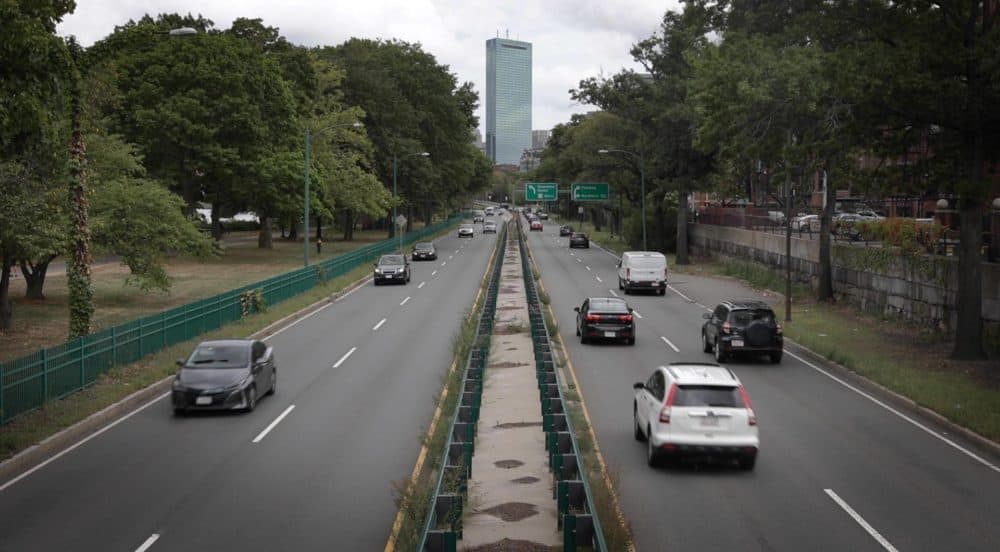Advertisement
Mass. Is One Of 3 States Joining Vehicle Emissions Pact

The audio atop this post contains a debrief from Barbara Moran, senior producing editor for WBUR's environment desk, on WBUR's All Things Considered.
Fewer than one-third of the state and local governments talking about forming a regional effort to staunch vehicle emissions along the East Coast have agreed to sign on to the final program from the outset, but officials said Monday they are confident the program will still be effective.
The coalition, which includes Massachusetts, settled on a carbon emission reduction target of 26% by 2032, which is more aggressive than any of the three scenarios presented a year ago and would add an estimated 5 to 9 cents to the price of a gallon of gas, according to officials involved in the effort.
The program would set a limit on vehicle emissions, and hold auctions for fuel suppliers that transport gasoline into Massachusetts and other states to purchase allowances for every ton of carbon dioxide that the fuel they are carrying would emit when burned.
Twelve states and Washington, D.C. began the process more than two years ago of developing a regional "cap-and-invest" program to reduce carbon pollution from cars and trucks and generate the resources needed to expand clean transit options and improve public health. On Monday, the leaders of just four jurisdictions — Massachusetts, Rhode Island, Connecticut and Washington, D.C. — signed on to be the program's initial members.
"The bipartisan Transportation and Climate Initiative program, or TCI-P, will allow participating jurisdictions to invest in equitable cleaner transportation options and create significant new economic opportunities while substantially improving public health across all our jurisdictions," Energy and Environmental Affairs Secretary Kathleen Theoharides said. "Massachusetts, Connecticut, Rhode Island and D.C. are committing to bold action to achieve our ambitious emissions reduction targets while positioning the jurisdictions and the region to grow the clean transportation economy."
Theoharides, who chairs the coalition of Northeast and Mid-Atlantic states pursuing the regional cap-and-trade program, said TCI aims to cap and reduce emissions from transportation by 26% by 2032 while generating annual proceeds for the participating governments that could exceed $366 million by 2032. That money would be reinvested into clean energy and public health improvements.
"The program works by setting a cap upstream on fuels. Because fuel distributors operate in a competitive marketplace with a growing diversity of alternative fuels such as hydrogen and electricity, this price signal will spur innovation including for regulated entities to reduce the carbon content of the fuels that they sell," Katie Dykes, commissioner of Connecticut's Department of Energy and Environmental Protection, said.
Advertisement
She added, "The total number of emission allowances will decline. Each year, resulting in less transportation pollution."
The reduction in emissions will almost certainly come at a cost to drivers in the form of higher gasoline and diesel prices passed along from the distributors. Dykes said it has been difficult to predict exactly what TCI will mean for drivers because fuel prices fluctuate all the time.
"Should fuel suppliers pass along costs, our modeling estimates show a potential increase of around five cents per gallon, which is far less than regular fluctuations the customers see in retail field prices," she said. Theoharides said the group's modeling, which was updated to reflect some of the impacts of the COVID-19 pandemic, currently shows "an absolute maximum estimated at nine cents."
At 5 to 9 cents, the estimated increase in fuel costs for drivers falls below the high-end forecast of 17 cents per gallon that TCI states gave last year. The Center for State Policy Analysis at Tufts University has suggested it could be even higher depending on how aggressive states choose to be in reducing emissions.
TCI is a central part of Gov. Charlie Baker's transportation and climate agenda, and is "critical" to the efforts that will be needed to achieve his administration's goal of net-zero emissions by 2050, Theoharides said.
The potential cost of the program for consumers scared off New Hampshire a year ago — Gov. Chris Sununu called it a "financial boondoggle" — and opponents argue the emissions reductions sought by the cap are not worth the impact on gas prices, particularly because TCI's own projections have shown that emissions are on track to decrease by 19% by 2032 even without any action from the compact states.
A year ago, Theoharides said the TCI coalition had not examined how many states it would take to make a regional pact work, but said that a "critical mass" of participation from the original 12 states and the District of Columbia would be necessary to make TCI successful.
On Monday, she said having Massachusetts, Rhode Island, Connecticut and Washington, D.C., onboard represented enough of a critical mass and that the TCI program "can absolutely be effective with three states and the District of Columbia."
"The states and the District participating in this program are getting the same emission reductions that were expected if all states joined and significant proceeds to invest back into clean transportation in our economies and in our transportation systems," she said. "All four of us have state and city goals, aggressive goals, in terms of reducing climate emissions, improving public health and then investing in clean transportation choices. And this program allows us to do that, allows us to get things started while continuing to work to get other states on board so they can realize those same benefits in their states."
The TCI program is slated to kick off in 2022, but that year will be solely a reporting year to collect a baseline of information and the cap-and-trade program will begin in earnest in 2023, officials said.
This segment aired on December 21, 2020.